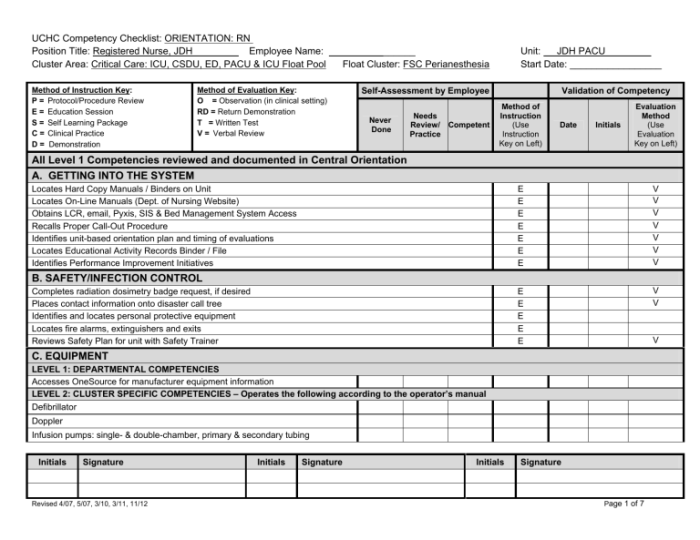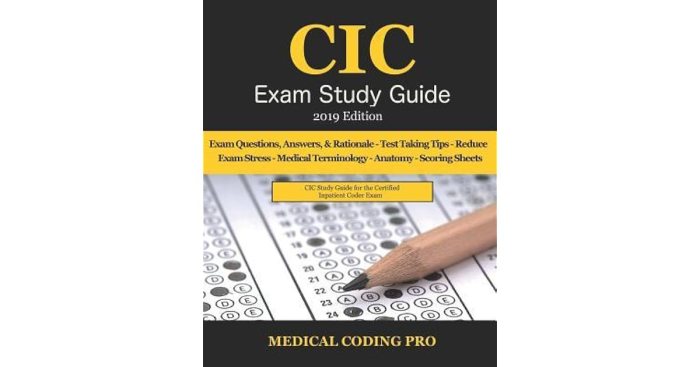The ICU competency test with answers is a crucial assessment tool for healthcare professionals seeking to demonstrate their knowledge and skills in intensive care unit (ICU) settings. This comprehensive guide delves into the purpose, key concepts, preparation strategies, test-taking tips, and sample questions of ICU competency tests, providing valuable insights for aspiring ICU professionals.
ICU competency tests play a pivotal role in evaluating healthcare professionals’ understanding of critical care principles, including critical care nursing, ventilator management, and hemodynamic monitoring. By understanding the content areas covered and employing effective study strategies, candidates can enhance their preparation and confidently navigate the challenges of ICU competency assessments.
Definition and Purpose of ICU Competency Test

ICU competency tests are standardized assessments designed to evaluate the knowledge, skills, and abilities of healthcare professionals working in intensive care units (ICUs). These tests play a crucial role in ensuring patient safety and quality of care by verifying that healthcare providers possess the necessary expertise to manage critically ill patients.
Different types of ICU competency tests are available, including written exams, oral examinations, and simulation-based assessments. Each type of test assesses different aspects of competency, such as theoretical knowledge, clinical skills, and decision-making abilities.
Key Concepts and Content Areas

ICU competency tests typically cover a wide range of core concepts and content areas relevant to critical care nursing, including:
- Patient assessment and monitoring
- Ventilator management
- Hemodynamic monitoring
- Cardiopulmonary resuscitation (CPR)
- Pharmacology in critical care
- Ethical and legal issues in critical care
Preparation and Study Strategies
Effective preparation for ICU competency tests requires a comprehensive study plan. Recommended resources include:
- Textbooks on critical care nursing
- Online courses and workshops
- Practice questions and mock exams
Study strategies should focus on active learning techniques, such as:
- Reviewing course materials and textbooks
- Attending lectures and workshops
- Completing practice questions and simulations
- Forming study groups and discussing key concepts
Test-Taking Tips and Strategies
To maximize performance on ICU competency tests, it is important to employ effective test-taking strategies:
- Manage time wisely by allocating specific time to each question
- Read questions carefully and identify key terms
- Eliminate incorrect answer choices before selecting an answer
- Use process of elimination to narrow down choices
- Avoid making careless mistakes by double-checking answers
Sample Questions and Answer Key

Sample ICU competency test questions can provide insights into the types of questions candidates can expect. Answer keys with detailed explanations facilitate self-assessment and understanding.
Question:Which of the following is the most appropriate initial nursing intervention for a patient with suspected sepsis?
Answer:Administer intravenous fluids and antibiotics
Explanation:Early administration of fluids and antibiotics is crucial in the management of sepsis to prevent organ damage and improve patient outcomes.
Credentialing and Certification: Icu Competency Test With Answers
ICU competency tests play a vital role in the credentialing and certification processes for healthcare professionals. Obtaining ICU-related certifications demonstrates proficiency in critical care nursing and enhances career opportunities.
Examples of ICU-related certifications include:
- Certified Critical Care Nurse (CCRN)
- Certified Critical Care Registered Nurse (CCRN-K)
- Critical Care Nurse Specialist (CCNS)
Key Questions Answered
What is the purpose of an ICU competency test?
ICU competency tests are designed to assess healthcare professionals’ knowledge and skills in intensive care unit settings, ensuring their competence in providing critical care to patients.
What are the different types of ICU competency tests available?
ICU competency tests vary in format, including written exams, oral exams, and practical skills assessments.
How can I prepare for an ICU competency test?
Effective preparation strategies include studying textbooks, attending online courses, and practicing with sample questions.
What are some tips for maximizing performance on an ICU competency test?
Test-taking tips include effective time management, careful question analysis, and avoiding common pitfalls.
What is the role of ICU competency tests in credentialing and certification processes?
ICU competency tests are often required for obtaining ICU-related certifications, which demonstrate a healthcare professional’s specialized knowledge and skills in critical care.